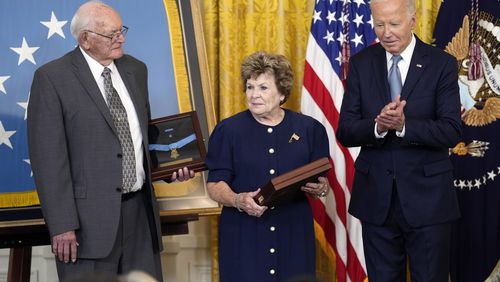In a nationally-watched vote that hints at the future of organized labor — and the challenge for union activists hoping for inroads in the South — workers at two Mercedes-Benz plants in Alabama have rejected membership in the United Auto Workers.
With ‘no’ votes at 56% of the total, the 5,000 employees at a huge auto assembly plant and a smaller, battery-pack factory east of Tuscaloosa have slammed the brakes on the momentum of an energetic UAW push to unionize the auto industry in the mostly nonunion South.
“I don’t know if it was totally unexpected — there was a lot of optimism — but the South is pretty hard to organize,” said labor historian Erik Loomis of the University of Rhode Island. “The South is a critical reason why American unions are not strong. This demonstrates why.”
The North American headquarters of Mercedes-Benz is in Atlanta. The company in a statement thanked employees “who asked questions, engaged in discussions, and ultimately, made their voices heard on this important issue. Our goal throughout this process was to ensure every eligible Team Member had the opportunity to participate in a fair election.”
UAW President Shawn Fain itold reporters that Mercedes had sweetened wages and conditions in the months before the vote to undermine the union drive.
“While this loss stings, these workers keep their heads held high,” he said. “What happens next is up to them.”
He said polling shows most people support the union, but “weak labor laws” enable companies to undermine popular approval, he said. “We’ll be back in Vance, I assure you of that.”
The defeat for the UAW follows an April triumph, when Volkswagen workers in Chattanooga voted overwhelmingly to join the UAW. By midafternoon Friday, the company had not yet issued a response to the vote.
For the union, the loss at Mercedes must be seen as painful, but provisional, Loomis said. “Remember that VW has been a decadeslong process.”
About 70% of the Mercedes workers had signed cards calling for this week’s union vote, so the union has to figure out why so many of those people ended up voting no, Loomis said. “You have to be conscientious about figuring out why this happened.”
Union optimism was fed not just by the VW vote, but by the hope of riding a broader, resurgent union movement.
Unions have scored a number of victories, including in Georgia. Workers at Blue Bird, a Fort Valley-based bus maker voted to join the United Steelworkers. A 50-worker group at Endurance Environmental Solutions in Norcross voted to join the International Brotherhood of Teamsters, as did another 40-worker group at Liberty Tire Recycling in Atlanta.
Alabama has also not been immune to union action.
In the past few days, workers at New Flyer, a bus maker in Anniston, voted with near unanimity to approve a new contract that gave them raises up to 38% and benefits that include expanded vacation and improved parental leave. Earlier this year, workers joined the International Union of Electrical Workers, the industrial division of the Communications Workers of America.
But when it comes to the auto industry, Mercedes-Benz has been one of the South’s very big fish. The UAW made it the second high-stakes target for its ambitious $40 million organizing campaign announced earlier this year, as the union follows up last year’s triumphant strike against U.S.-based automakers. That effort, against General Motors, Ford and Stellantis, led to a contract with huge wage gains.
But unlike that campaign — in which already organized workers pressured U.S. companies — the new drive is meant to expand union membership by signing up tens of thousands of workers in nonunion auto plants in a region where past UAW campaigns have gone to die.
It is no accident that nearly all of the new auto assembly plants — and many of the smaller satellite parts plants — have opened in the south.
Companies from Japan, South Korea and Germany, which are unionized at home, have chosen the South as a location at least in part because of the region’s historic resistance to unions.
With that in mind, skeptics wondered if VW might be a one-off, and Friday’s vote makes that skepticism look justified.
The Mercedes campaign was on rougher terrain than VW’s. The plants were farther south and they were located in rural areas, not a city. Tennessee already had one unionized plant, but Alabama did not. And Mercedes — despite the unionization of its own European workforce — has been more energetically opposed to the union, sparking complaints by workers that it was using intimidation and other union-busting tactics.
The company has denied that charge.
The UAW has filed charges against Mercedes-Benz in Germany, alleging that its anti-union campaign in Alabama violates that country’s law on global supply chain practices.
And, as in Chattanooga, the union faced full-throated opposition from the region’s political leaders, including Alabama Gov. Kay Ivey, who posted on X, the site formerly called Twitter, that the UAW was “corrupt, shifty and a dangerous leech.”
In a joint statement with five other southern governors, including Georgia Gov. Brian Kemp and Tennessee’s Bill Lee, she warned VW workers that joining the UAW could cost them their jobs and threaten the region’s economic progress.
Pressure from politicians, lobbyists and the company itself present a strong headwind to organizing, said Art Wheaton, director of labor studies at Cornell University. “I am not shocked that they lost.”
“This was a really new campaign at Mercedes. They started with nothing and they got 45%. They have reason to be optimistic,” he said.
The UAW still has a number of available targets in the South, and — as it did at VW — the union can try again at Mercedes, although it must wait a year.
Wheaton from Cornell said he expects the UAW’s next target to be Hyundai, which has a plant in Montgomery.
Among other Southern auto plants are BMW in South Carolina — another German company with a strong union back home — and Georgia’s Kia plant in West Point, as well as an SK Battery factory in Georgia.
The UAW will respond to worker interest when picking the next target, Wheaton said. “But eventually, I expect them to go after all of them.”
But whatever their home turf, they operate in the South where the culture, politics and economics work against union. So, realistically, the union campaign has always been a long, uphill battle, said labor historian Loomis.
Defeat has delayed, but not necessarily derailed that effort, he said. “The UAW really needs to win the next one. Or else this is just one more failed southern campaign.”
About the Author







